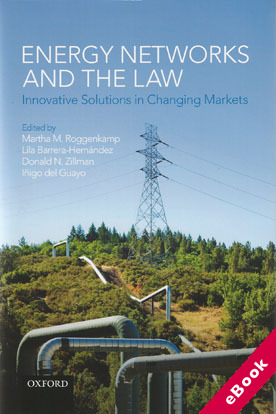We will be closed from 5pm Thursday 17th April for the Easter Bank Holidays, re-opening at 8.30am on Tuesday 22nd April. Any orders placed during this period will be processed when we re-open.

The device(s) you use to access the eBook content must be authorized with an Adobe ID before you download the product otherwise it will fail to register correctly.
For further information see https://www.wildy.com/ebook-formats
Once the order is confirmed an automated e-mail will be sent to you to allow you to download the eBook.
All eBooks are supplied firm sale and cannot be returned. If you believe there is a fault with your eBook then contact us on ebooks@wildy.com and we will help in resolving the issue. This does not affect your statutory rights.
Networks like cables and pipelines are essential for a functioning energy market. This book provides a clear and insightful overview of the legal challenges this poses in the modern world.
The construction and use of these networks depends on developments in technology, policies, and legal regulation. Recently, the energy sector has been faced with considerable challenges and changes. Energy liberalisation and deregulation, and the fact that traditional energy supplies like fossil fuels and large hydro plants are increasingly located far from the area of demand has drastically changed the energy landscape. The need for new sources of energy supply can therefore be found all over the world.
This book investigates the challenges that face governments engaged in this renewal, particularly since in many cases these networks are, by necessity, international. The construction of new networks always involves the application of planning and environmental laws, and the complications these pose only increase as networks pass through the territory of several different countries. This book analyzes the evolution of this area from several angles, both geographical and legal.
The authors combine knowledge and expertise from a variety of sources and backgrounds to present an invaluable overview of the regulatory developments and perspectives that shape the legal frameworks in which governments develop these networks, and the way in which account must be taken of new sources of energy by law-makers.